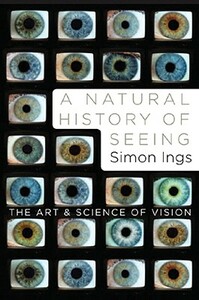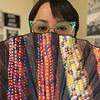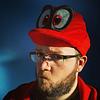Take a photo of a barcode or cover
This book probably deserves another star but I didn't "love" it so I gave it four instead. The reason I didn't love it, really can’t be blamed on Simon Ings. I think he has actually accomplished something quite amazing. The fault lay in my being not quite knowledgeable enough going in, so that bits of it were a bit of a slog. I will confess that some pages, I read twice and then just shrugged and moved on. Other bits, however, were absolutely fascinating. I found the chapter on how we perceive colour particularly interesting.
This book is quite broad in scope, despite being entirely about the eye, so those looking for specific, in depth information in any one area will probably need to go elsewhere. If, however you are interested in evolutionary theory generally, the history of our knowledge of vision and the role that it plays in our lives (and the lives of other beasts as well) and want something meatier than your average pop science offering, then this is your book.
This book is quite broad in scope, despite being entirely about the eye, so those looking for specific, in depth information in any one area will probably need to go elsewhere. If, however you are interested in evolutionary theory generally, the history of our knowledge of vision and the role that it plays in our lives (and the lives of other beasts as well) and want something meatier than your average pop science offering, then this is your book.
Did you know...We spend about one-tenth of our waking hours completely blind. Only one percent of what we see is in focus at any one time. The blind can be taught to see through their chests.
So much fascinating stuff in here. Some of it was a bit too complex for me to follow, but at least I know why Bees bump into walls so much now. The writing style is fluid and easy to read but factual and authoritative at the same time, and with an infectious curiosity and fascination for the subject matter. Definitely up there with some of my favourite science writing.
I enjoyed this book so much! It was exactly what I was looking for, a book that goes into the experiments and ideas that shaped our understanding of vision. I learned much more than I expected and was surprised to see some notable scientists did their part as well for the advancement of visual science. I would recommend it to anyone who loves reading about the history of medicine or science!
S'allright, not great. Very interesting information, but too many times I had to think to myself, "But what does that really MEAN?!" The writing often sacrifices clarity for lyricism. There's probably a better book out there about the science of vision; I just picked this up at the library because it looked interesting. Now I want to find that better book, because this was a bit of a slog. If you read this, read Crashing Through by Robert Kurson.
It's a pop science book about how the eye works, how it evolved, and how different scientists discovered more and more about optics and light.
It's interesting.
It's interesting.


